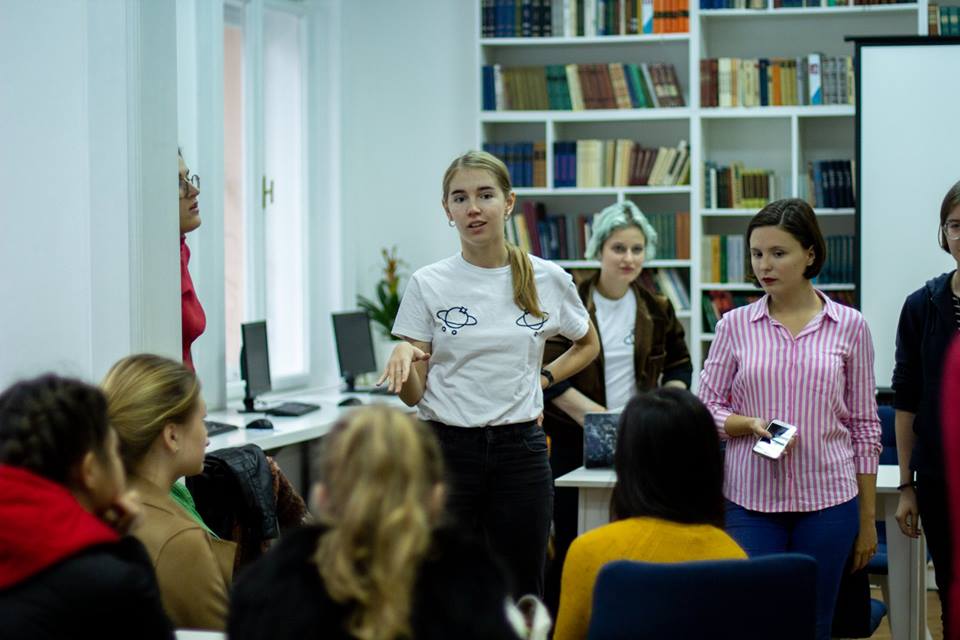Katya Myachina thought she would die.
She had just been diagnosed with human papillomavirus, or HPV, the most common sexually transmitted infection, or STI. According to UNICEF, it affects 80 to 90 percent of sexually active young people. And, in many cases, the virus clears the body on its own.
But Myachina didn’t know that, and her gynecologist couldn’t tell her much about it either. She began searching for information online, but found only limited informational resources — particularly in Ukrainian and Russian.
“Then this deep panic converted into an understanding that I — at 19 or 20 — had never heard of (HPV) and had never had any good and qualified conversations about sex, contraception, and STIs,” Myachina says.
Soon she had an idea: to create an online platform that discusses sex openly, based upon medical knowledge, with young people who would otherwise hear myths and misinformation from their friends and the internet.
Around four years later, in September 2018, Myachina, who is a former Kyiv Post intern, and two other like-minded young women, Yulia Kovalchuk and Liza Panchenko, launched Vpershe — “For the first time” in Ukrainian — a website covering sex, relationships, health, and sexuality.
With a smooth design and creative illustrations, the site provides factual information about STIs and contraception, first-person accounts of young people dealing with issues related to body and sexuality, and much more. It also allows them to ask anonymous questions to medical professionals and sex educators.
“The style of our articles we describe as a cool older sister or cool older brother,” says Kovalchuk.
The site is written in simple language, utilizes humor, and explains difficult words to strike a tone accessible to teenagers.
The reason is that “if you even write an article about something like gender, some school kids will just not know what gender means,” Kovalchuk told the Kyiv Post.
Vpershe aims to satisfy an urgent need, according to its founders. Ukrainian schools lack universal sex education. Often, even parents don’t talk with their children about the birds and the bees.
“I don’t remember any person in school or in my family approaching me when I was a teenager and talking about sex,” Myachina recalls. “The things I found out, I found out myself or through other teenagers.”
As a result, Ukraine has one of the biggest HIV epidemics in Europe. Moreover, today most of the newly registered cases of HIV/AIDS are among people ages 15 to 30, according to the Elena Pinchuk Foundation, a charitable organization run by the daughter of former President Leonid Kuchma and focused on combating the disease. The rate of underage pregnancy in Ukraine is also six times higher than in Germany, Vpershe notes on its website.
But the situation is not hopeless, Myachina notes. In the last year, sex education in Ukraine has gotten a little better. With the support of the Elena Pinchuk Foundation, the Ukrainian online courses platform Prometheus now offers a course on sex education. Myachina considers this an important breakthrough.

Katya Myachina (C) and Yulia Kovalchuk (C, back) deliver a sex education education lecture at the URBAN Library in Lviv on Oct. 19, 2018. (Anna Ilchenko)
Still, there is more work to be done, and Vpershe hopes to be the one to do it. The site devotes considerable attention to the lesbian, gay, bisexual, and transgender — or LGBT — community, asexuality, and concepts like consent.
All of these identities and concepts are poorly understood and not widely accepted in Ukraine. In fact, on Jan. 11, when legislation defining rape as sex without consent — as opposed to sex by force or threat — came into effect, many mocked the law. Social media users and some news outlets joked that Ukrainians would now have to sign legally binding contracts to have sex.
Myachina believes that building a more tolerant society is an urgent part of Vpershe’s mission. She notes that the level of militarism is growing in Ukraine. She recalls reading that, around the globe, teenagers are moving politically to the right, not the left — something that is historically uncommon.
“This is terrifying for us,” Myachina says.
More broadly, Vpershe’s work is informed by its founders’ personal experiences. All three come from provincial cities, and have a sense of the situation outside Kyiv. Myachina notes that she grew up in Zelenodolsk, a city of 14,000 some 470 kilometers to the southeast of Kyiv in Dnipropetrovsk Oblast.
It’s a place Myachina characterizes as “a small town in the middle of nowhere.” The only sex educators who ever visited her school growing up were conservative Christians pushing an “abstinence until marriage” agenda.
But a site like Vpershe could reach towns like Zelenodolsk — and perhaps even further-flung locales. Currently, Vpershe is exclusively in Ukrainian. But the founders hope to translate it into Russian and eventually even Arabic and Farsi, the languages of countries where progressive sex ed is also often lacking.
So far, however, they are focusing their efforts at home. The site has virtually no budget and all its employees and writers are volunteers.
But they are encouraged by the response they have received. They say they have seen little blowback from the broader public. “Even my grandparents, who at first thought I was completely crazy, now think that what I am doing is fine,” Kovalchuk says.
And usually, those willing to engage with Vpershe give good feedback. It can even be inspiring, Myachina told the Kyiv Post.
“We always feel like we have a reason to continue to work,” she says. “Even adults tell us that we opened their eyes to some issues they’ve never heard about.”
